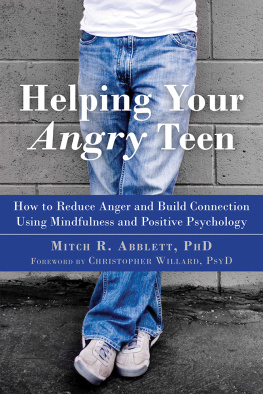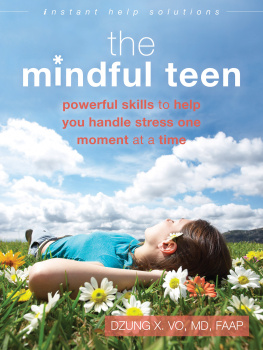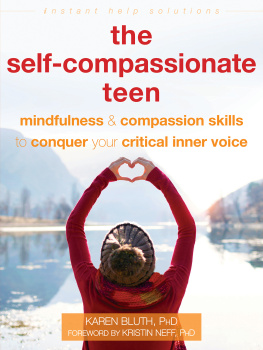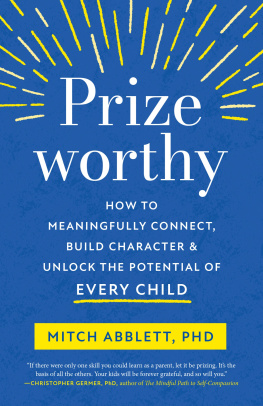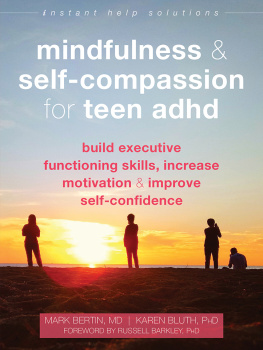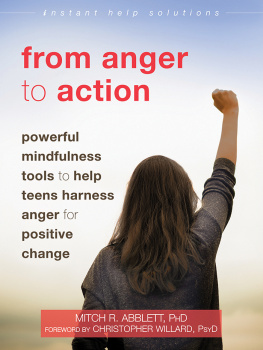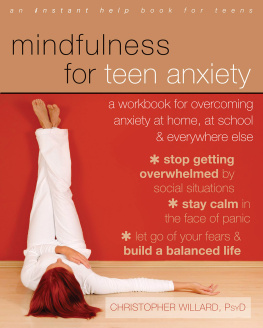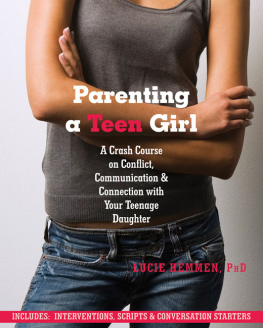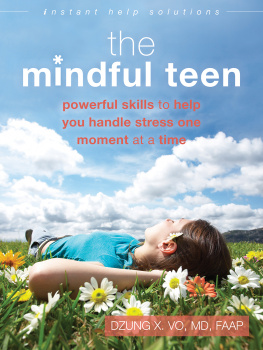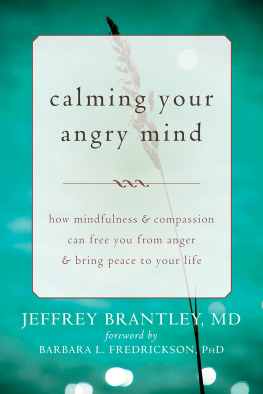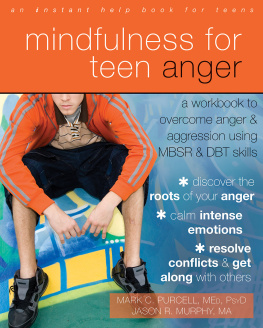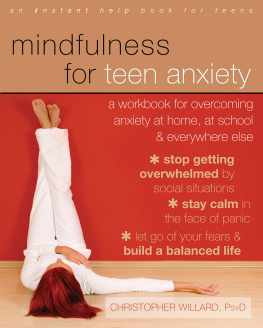
Few challenges of parenting are more daunting than dealing with an angry teen. Having experienced moments like the ones that Mitch Abblett describes here, I can relate to the periodic clouds of utter hopelessness, despair, and frustration that arise when our deep love and devotion to our children is challenged by their behavior and their emotions. This book not only provides a rational and scientifically grounded framework for understanding the often mystifying and bewildering expression of teen anger, but it pairs that understanding with the deep and timeless wisdom of mindfulness practice that can allow us to step outside the anger cloud and maintain some presence to reconnect with ourselves. By practicing mindfulness, we can reclaim our compassion, our inner wisdom, and the practical skills that Abblett teaches here.
StevenD. Hickman, PsyD, executive director of the University of California, San Diegos Center for Mindfulness; executive director of the Center for Mindful Self-Compassion; clinical psychologist; and associate clinical professor at the UC San Diego School of Medicine
This gem of wisdom from Mitch Abblett is about way more than teen anger. Mitch wisely recognizes that the openhearted quality of your own unconditionally loving presence is the greatest gift that you can offer your teen. By starting with cultivating your own embodied mindfulness, this book guides you toward the kind of authentic and transformative relationship with your teen that every parent aspires to.
DzungX. Vo, MD, pediatrician, adolescent medicine specialist, and author of TheMindfulTeen
A compassionate, easy-to-read book providing practical guidance while supporting parents who are almost certainly suffering along with their struggling teens.
MarkBertin, MD, developmental pediatrics; author of MindfulParentingforADHD
HelpingYourAngryTeen offers clear, useful tools for parents, therapists, and other caregivers to help the angry teenagers in their lives. Adults new to mindfulness might find the tools developed by Mitch Ablett to help angry teens feel better will help them feel better, too.
SusanKaiserGreenland, author of MindfulGames and TheMindfulChild
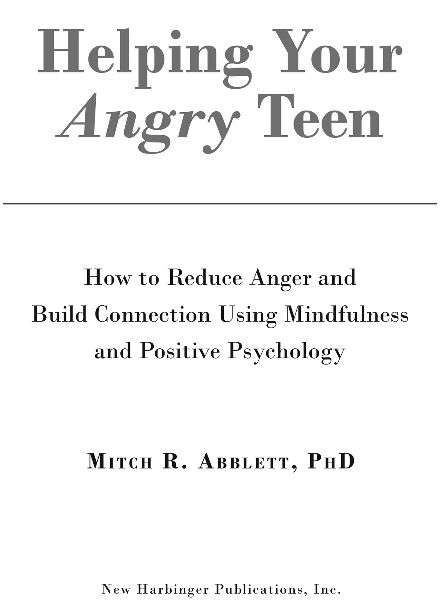
Publishers Note
This publication is designed to provide accurate and authoritative information in regard to the subject matter covered. It is sold with the understanding that the publisher is not engaged in rendering psychological, financial, legal, or other professional services. If expert assistance or counseling is needed, the services of a competent professional should be sought.
Distributed in Canada by Raincoast Books
Copyright 2017 by Mitch R. Abblett
New Harbinger Publications, Inc.
5674 Shattuck Avenue
Oakland, CA 94609
www.newharbinger.com
Giving Effective Instructions Therapy Module adapted from Modular Approach to Therapy for Children with Anxiety, Depression, Trauma, or Conduct Problems by Bruce F. Chorpita and John R. Weisz, copyright 2009 by PracticeWise, LLC. Used by permission.
Problem-Solving Therapy Module adapted from Modular Approach to Therapy for Children with Anxiety, Depression, Trauma, or Conduct Problems by Bruce F. Chorpita and John R. Weisz, copyright 2009 by PracticeWise, LLC. Used by permission.
Cover design by Amy Shoup
Acquired by Jess OBrien
Edited by Amy Johnson
All Rights Reserved
Library of Congress Cataloging-in-Publication Data on file
To my father, a patient worker of wood and an example of craftsmanship in parenting, an ability we need as we help our children toward their potential.
To my mother, a lover of dancing and a reminder of the grace required to weave love and compassion into the many moments of raising children.
Contents
Christopher Willard, PsyDCambridge, Massachusettsauthor of Mindfulness for Teen Anxiety and Growing Up Mindful
I live in Boston, a city with one of the highest densities of therapists in the country, and travel to conference after conference, meeting therapists of all stripes. Heres what Ive found: there are very few really bad therapists, very few really good therapists, and many well-meaning but mediocre therapists. Not bad ones, mind you, and not dumb ones eitheralmost all have great ideas, passion, and solid credentials.
Ive met family therapists who can talk a good game at a conference, who can throw around jargon about neuroses and complexes, but dont do much for you or your kid. I know therapists whom kids love to see but who struggle to make concrete recommendations to parents. And I know therapists who hand out sticker charts and reward systems that just end up in the family recycling bin. Then there are the therapists whom parents love but with whom kids sit in stonewalling silence for fifty minutes straight during one-on-one sessions. Ive met plenty of prescribers with Ivy League diplomas who hide behind their prescription pads in the face of angry teenagers and hopeless families.
Ive also read dozens of parenting books in my own quest to be a better therapist, meditator, writer, or parent, books that could have been boiled down to a few PowerPoint slides at best. To be honest, there are only a handful that I would recommend beyond their introductionsand I know hundreds of hopeless families hungry for help.
And then several years ago I met Mitch, read his first book, and heard him give a talk. We met up at a local lunch spot; we swapped stories about writing, teaching, therapy, and family. Five years later, Mitch is one of my best friends and a colleague and collaborator I respect above almost any otherespecially when it comes to tough kids. Part of what makes Mitch special is that while he is smart (he does have the Ivy credentials) and has a toolbox of techniques, he doesnt turn away from the heat of family conflict. Rather, he marches in like a first responder, ready to face whatever comes his way. At the same time, hes a fully authentic human being who brings all of himself to both his own family and the families he works with. His warmth and charisma shine through even in his writingno easy feat.
What youll find in this book is Mitch at his best. Clear and compassionate, human and humorous, and most of all, eminently practical in his approach to dealing with angry teens. What Mitch offers are lessons in how you can be the best parent you can be for your teen, not the best parent according to someone elses five-step miracle recipe for a calm kid.
Little can feel more frightening than an out-of-control child raging at us. When anger burns over in adolescence, you may worry that your dreams for your teen will go up in flames too. What youll get from this book is the wisdom and compassion to cool the flames of anger in your family, yourself, and your teen.
Mitch will challenge youthere will be work for you to undertakebut he will challenge you compassionately. And Mitch will never send you out there without first giving you what you need. The wilderness camp I attended as a young man (probably not unlike where some angry teens end up) had a saying: Theres no such thing as bad weather, just inadequate gear. Mitch will give you the gear you need to weather any storm with your angry adolescent.
In chapter 1, Mitch offers you the lay of the land, helping you to understand your teen, yourself, and your patterns as a family. In chapter 2, he gives you critical gear from mindfulness and positive psychology, and explains how to use it both on a regular basis and in emergencies. In chapter 3, Mitch offers you a map and explains how to chart your course forward while avoiding the dangers along the way. In chapter 4, Mitch hands you the reins and you learn the leadership skills you need to navigate your journey. Finally, in chapter 5, you and your family learn to empower each other, so that you can again enjoy the lifelong journey of growing together.
Next page
